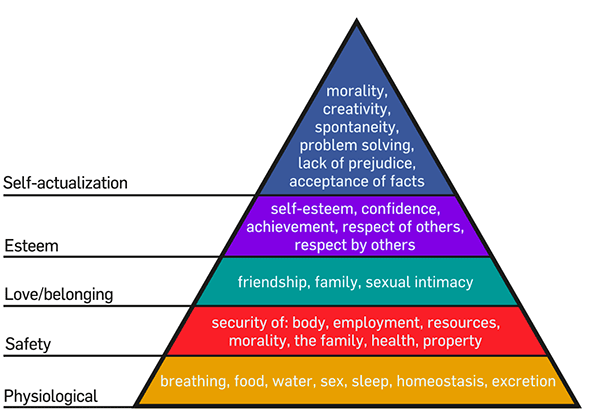By Sue Rowen, M.A., MFT
In grief, individuals often have a feeling of generalized fear and being unable to control the body symptoms that go along with feelings of anxiety and panic. If we look at Abraham Maslow’s “Hierarchy of Needs Theory,” we see some of the basis for this anxiety.
It becomes apparent that when we experience the death of a loved one, we are thrown to the bottom two levels of the pyramid. We are confronted with the fear that we may no longer feel safe and may not be able to take care of ourselves and our basic needs.
One’s personal world has changed forever. When we are grieving the death of a loved one we feel stripped of the resources that, in the past, have been there to support us through stressful times.
- “Do I have enough money to support myself?
- “Will I be okay alone?”
- “How am I going to drive at night by myself?”
- “What if I get sick? Who will help me?”
Our loved one, a major part of our support system and someone we have depended on for such support, is no longer present for us.
The grieving process, particularly in the early stages, produces feelings of powerlessness. Feeling that we have little control over the course of events in our lives, and fearing our inability to meet our most basic needs creates generalized anxiety about what the future holds.
These thoughts and feelings may cause our bodies to present symptoms that make us feel even more fearful and out of control.
When in fear, our bodies release neurotransmitters, adrenalin and cortisol. They are released when we are in “stress mode” and move us into a “flight/fight” response.
The “flight/fight” response is our primitive way of responding to what we perceive as a life-threatening event.
When we have no place to go with the flight/fight response, we become “frozen” and immobilized, “like a deer in headlights”.
Our fears are experienced as generalized anxiety and we may feel confusion, inability to focus or make decisions, fatigue, change in appetite, depression and a myriad of other body symptoms.
Body symptoms may include shaking, a feeling of not being able to breathe and feeling detached from reality, feeling like we’ve left our body.
- “What do I do?
- I feel frightened.
- I can’t describe what I feel.
- I am alone and I feel like I am going to die or go crazy.
- I can’t call my family in the middle of the night.”
There are skills and behaviors that can help to manage anxiety symptoms.
Physiologically, it is important to reduce the symptoms in the body and to feel more grounded. If you’re able to have some control over the physical symptoms, then you can better regain psychological feelings of control.
The following may help you to reduce symptoms and ground:
- Sit down and remind yourself that this is chemistry in the body. Feel your body on the chair and notice things in your environment.
- Give yourself permission to say, “I am feeling panicky and afraid”. There is often relief in just the expression of the feeling. Give yourself permission to say, “This is the chemistry of fear. I won’t die from it.”
- Bring yourself present to your environment. Wear a rubber band on your wrist and lightly snap it to distract yourself from your thoughts from the symptoms and become more present.
- Create a “safe place” in your mind, a place that you can visit to calm down.
- Practice mindfulness, relaxation and deep breathing techniques that bring you more into the present and a calmer, more grounded body.
- Find an exercise routine that allows to promote the brain chemicals, serotonin and dopamine, which are the body’s natural “uppers.”
There is no single way to reduce symptoms of anxiety associated with grieving or stress in general.
The solution is in in facing the fear and grief that surround the loss of a loved one and learning the skills and behaviors that help us to problem solve our circumstances and manage the symptoms of anxiety.
If you find it difficult to manage your symptoms of anxiety and fear on your own, give yourself permission to seek professional help. Grief is sometimes complicated and a difficult journey to negotiate.


